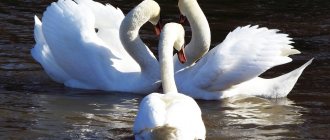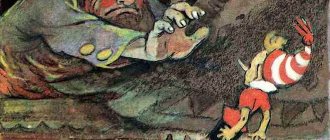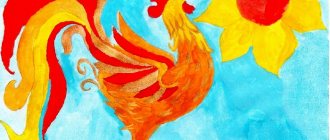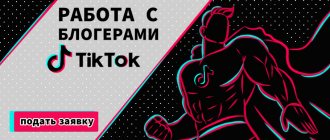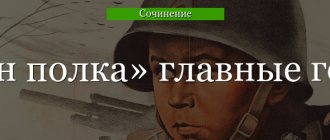⭐⭐⭐⭐⭐ “Warm bread” in 2 minutes and in detail in 10 minutes .
The story by K. G. Paustovsky “Warm Bread” is more reminiscent of an adult parable than a children's fairy tale. Despite the fantastic nature of the events described, this is a story about the relationship between man and nature. The plot of the work is based on deep moral content. Human indifference, its consequences, forgiveness, mercy and bread, as a symbol of the boy’s warming soul.
A very brief retelling of the story “Warm Bread.”
As a detachment passes through the small village of Berezhki, the cavalrymen leave behind a horse wounded by a shell fragment. An old miller takes care of the animal and adapts it to help repair the dam for the only mill in the village, on the work of which people’s lives depend. Now all residents can grind wheat and bake bread at home.
But the miller is poor and cannot feed his horse. Therefore, the animal often walks around yards in search of food. The peasants willingly share their bread with him and love him as “one of their own.”
One day the horse “asks” for food from Filka, but a cocky boy hits the animal in the face. The horse gets offended and leaves. Immediately a strong snowstorm and frost descend on the village. Ice bound the mill, and people lost the opportunity to grind grain.
To a boy frightened by a sudden snowstorm, his grandmother tells a legend about a soldier who, for an insult, sent frost and cold to the village of the offender. Filka thinks that it is because of him that bad weather is raging in the village. The boy hurries to the miller Pankrat, who invites him to think about his behavior and correct the situation.
Filka decides to cut through the ice to make the mill work. Together with the children and old people, they cut the ice of the dam and set the millstones in motion. Now the whole village will have bread.
And Filka decided to make peace with the horse, and comes to Pankrat to treat the animal with fresh bread and salt. At first the horse is afraid of the boy, but calms down and takes the treat from his hands. And as a sign of reconciliation, he puts his head on the boy’s shoulder.
Brief retelling in the abstract
If you don’t have time to read the summary, you can read the retelling in the abstract. It conveys the plot briefly but accurately. A fragment of an exploding shell wounded the black horse, and the cavalrymen left him in the village. The old miller Pankrat sheltered and took out the animal. A horse named Boy helped him in his work - he transported boards and clay to repair the dam. It was difficult for the miller to feed the black horse, and the horse often walked around the village asking for food.
One day the Boy came to the house where Filka lived with his grandmother. Going out into the street with a crust of bread, he got angry when he saw the horse, shouted at him, and then threw the crust into the snow. A snowstorm immediately swept up, it became cold, and the boy barely found the entrance to the house.
It was frosty at night. The old woman told her grandson that a similar story had already happened once. Then the heartless man offended the wounded soldier. She assumed that this time there was a similar reason. The boy ran to Pankrat and asked how to fix everything. The miller suggested that it was necessary to invent an escape from the cold so that the mill could work.
An old woman tells her grandson a legend about an evil man
Filka gathered the guys, together they cut an ice hole, and almost immediately there was a thaw. Then the children and the miller helped Filka make peace with the horse. This is where the brief retelling of the work “Warm Bread” can end.
A summary of the story “Warm Bread” in detail.
While crossing the village of Berezhki, outside the outskirts, the cavalrymen come under fire. A black horse was seriously wounded in the leg by a German shell fragment. The commander leaves the animal in the village in the care of the old miller Pankrat.
Author: Konstantin Georgievich Paustovsky
A gray-haired and menacing old man, whom local children consider a sorcerer, lives in a non-working mill. He becomes attached to the wounded horse with his soul and nurses it back to health. The strengthened animal helps Pankrat - he carries building materials to repair the dam.
But the miller is poor and has nothing to feed his assistant. That's why the horse goes around the yards to beg. He would stand near the gate, begin to snort and bang his muzzle on the poles - so they brought him out, either a bunch of beet tops or a hunk of stale bread. Sometimes they will reward you with a sweet carrot. Rumors spread throughout the villages that the horse was shared, which meant that it was everyone’s responsibility to feed it. Especially when the animal suffered so much from the enemy, he was wounded in the leg.
In the same village, a cocky boy named Filka lives with his grandmother. He is distrustful and silent, and to all calls to him he always answers “Fuck you!” Local kids gave him an offensive nickname for this habit: “Well, you.” The boy was not shy even about his grandmother. When she scolded him for being rude, he angrily shouted, “I'm tired of it! Yah you!"
This winter in the village has been surprisingly warm, only the snow that fell immediately melted. Crows, wet from sediment, jostling and cawing, sat on the chimneys in the hope of warming up. There was water in the mill flume, with snowflakes swirling on the surface.
Pankrat is going to grind grain - local housewives have already come up more than once with a request to replenish their flour supplies. And the wounded black horse came up to Filka’s gate and tapped his muzzle on it. Grandma was away, Filka was alone at home, sitting at the table and having breakfast with a piece of bread and salt.
The boy reluctantly goes out the gate. The animal, seeing the bread, reaches out to it with its lips. This angered Filka, and he hit the horse in the mouth with a backhand, shouting “Devil, fuck you!” Out of surprise, the animal shakes its head and recoils, and the boy throws the bread far into the snow and continues to shout:
- Take your bread, dig it out of the snow with your muzzle! You can't get enough of these Christ-seekers!
Filka’s malicious misdeed gave rise to rumors in the village about amazing phenomena, which they talk about as if they never happened in Berezhki.
And then the boy noticed a tear in the animal’s eyes, and he heard a prolonged and pitiful laugh. The horse waved his tail, and that very minute a violent snowstorm began. The wind blew in, howled piercingly among the chimneys, and covered Filkino's throat with snow. Rushing towards the house, the boy was not immediately able to find the porch - the snow storm was so fierce, lashing his eyes. And pieces of thatch from the roofs were flying around and the torn shutters of the windows were flapping. Snow pillars rose higher and higher from the fields, rushing towards the village, rustling angrily and spinning in the wind.
The boy finally jumped into the house, leaned against the door and listened. A maddened wind roared in the yard, throwing snow over the windows, and Filka thought he heard the whistling of a horse's tail, with which the horse he had offended was hitting itself on the legs.
The snowstorm died down in the evening. Filka's grandmother was finally able to get home from her neighbor. And at night, such a fierce cold shackled the village that it seemed that the stars were also frozen to the icy sky. Everyone imagined the creaking of snow under felt boots of frost, squeezing the log walls so that they began to crack and burst.
In Filka’s house, the grandmother was quietly crying behind the stove, wailing about how the wells had frozen, and now they would definitely die. There is no water, and the flour has run out, and the mill is frozen.
Mice began to run out from under the floor and bury themselves near the stove in the straw, where it was still a little warm. Filka also cried out of fear, covering his head on the stove with a sheepskin coat and listening to the grandmother’s lamentations.
“A hundred years have passed since the same cold came to our village,” the grandmother said, “the trees dried up, many birds were killed, all the water froze. For ten years there was no harvest; the seeds died in the ground. Animals walked around it - they don’t like deserts.
- Why did the frost come? – Filka asked, shivering even more in his sheepskin coat.
“It’s human malice that’s to blame,” answered the grandmother. “An old soldier passed by our village.” He asked for bread in one yard. A sleepy and angry man came out to him and threw a stale crust of bread onto the ground. The soldier said that he could not lift the bread, he had no legs. The man asked where the serviceman lost his leg. “We fought with the Turks in the Balkans, in the mountains,” the soldier answered. The man laughed and said, “There’s no one to serve you, you’ll raise the bread yourself.” The soldier took a long time to maneuver, but was still able to reach the crust. And the servant saw that the bread was spoiled and he couldn’t eat it. People said, he came out of the yard, whistled, and suddenly a fierce storm arose. A blizzard tore off roofs, an impenetrable blizzard roared. And that rude man died.
- Why? – Filka asked hoarsely.
“Because of the cold in my heart,” said the grandmother, “This means that in our village there is an equally bad person who wronged someone in vain.” It's freezing outside.
-Are we all going to die? - the boy from the sheepskin coat became worried - What should I do?
“Let’s hope, Filka, that this offender will correct his mistake.”
- How can I fix it, grandma? - the boy sobbed.
“Our miller Pankrat, the cunning old man, knows about that.” Yes, I can’t run to the mill now - everything has skidded.
- Yah you! – Filka shouted out of habit and fell silent in his sheepskin coat.
At night, when the grandmother had already fallen asleep, the boy quietly crawled off the stove, wrapped himself in his sheepskin coat, jumped out into the street and ran to the mill.
Near the dam he was met by graying willows with branches glassy from frost. The burning frosty air pierced my chest. Filka was no longer running; he was paddling heavily in the snow with his felt boots.
The boy knocked on the window of Pankrat's hut. Immediately behind the hut, a horse neighed and restlessly kicked its hooves. Crouched in fear, Filka held his breath. The door opened, a heavy hand grabbed the boy by the collar of his sheepskin coat and quickly pulled him inside.
“Speak before you die,” Pankrat carefully examined the guest.
Choking with tears, Filka talked about how he had offended the horse.
- You did bad Filka! - the miller scoffed - Now the village will disappear - there is no flour, and the mill seems to be sealed with frost. We need to think about how we will save people. And make amends to the horse. I'll give you an hour and a quarter to think about it.
In the entryway of Pankratova's hut there lived a magpie. She couldn't sleep because of the cold, so she overheard the conversation. When the voices fell silent, she jumped out of the doorway and flew to the south. Like an experienced bird, the magpie deliberately flew low to the ground, where warmth wafted from the huts and fields.
Meanwhile, Filka, fidgeting on the bench, tried to figure out how to rectify the situation.
“Well, time has passed, speak up,” Pankrat urged him.
“I’ll call the guys at dawn.” We will use crowbars to cut through the ice at the mill flume, there is water there. As it goes, you will start the mill. The wheel will turn several times, the millstones will heat up, and the bread will be ground.
“Go, gather the guys,” Pankrat agreed, “And I’ll help the old people, together we can cut ice faster and more fun!”
On a frosty morning, the crimson sun rose over the river. Near the mill, fires burned brightly and the sound of crowbars could be heard. Working since dawn, the residents did not notice how warm air blew from the east. And when they saw it, the south wind was making a loud noise in the thawed birch grove, and icicles were falling loudly from the roofs.
Sensing the warmth, the crows came out of their traps, stomped on the branches and croaked loudly. In the evening, when black water splashed in the cut holes, an old magpie flew in.
The old men and boys were sincerely happy that they managed to cut through the ice. In the general rejoicing, a magpie's noise was heard, which no one except the crows understood. She talked about the warm sea, where she met the south wind, and how she persuaded him to fly here to warm people.
No one knows how true the magpie's story is, but in the evening the ice finally gave in and water rushed into the mill with a murmur. The wheel, creaking tiredly and shaking off the icicles, slowly began to rotate. The prolonged grinding of millstones was heard, and the whole mill began to shake. White flour poured into the sacks in a stream, birch firewood was split in the huts, and a hot stove fire glowed in the windows. And the smell of ruddy, warm bread spread throughout the village.
The next morning the guys approached Pankrat's hut. Filka was with him. The boy held a hot loaf of fresh bread tightly in his hands, and next to him little Nikolka carried a wooden salt shaker filled to the top with yellow salt.
Pankrat was surprised:
- Why do I get such honors?
“We are bringing bread and salt to your horse from Filka.” He wants to make peace with him, the guys explained.
The old man opened the barn and released the horse. The horse smelled the grain and pulled its head towards Filka. But when she saw the boy, she recoiled in fear and began to beat with her hooves.
The guys standing around whispered quietly, and Filka began to cry in the presence of everyone. Pankrat approached the animal, stroked the scruff of the neck and said:
- Forgive him, he is not an evil person. Take the bread.
The horse shook his head in response, stood for a while in thought and took the piece from Filka’s hands with wet lips. The boy smiled, wiping away tears from his cheeks with his sleeve, and the horse, snorting and shifting from foot to foot, chewed. Then he came up and laid his head on Filka’s shoulder.
Everyone smiled. Only the magpie on the willow tree chattered angrily. She probably boasted that she had reconciled Filka with her horse. But no one listened to her, this made the bird even angrier.
